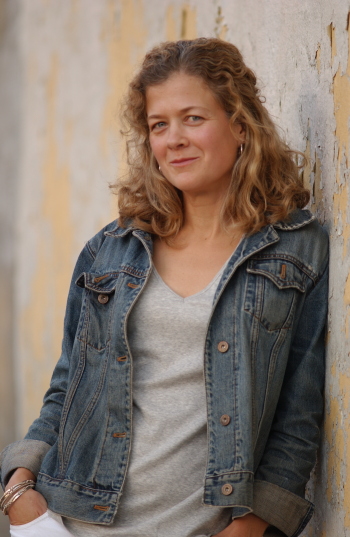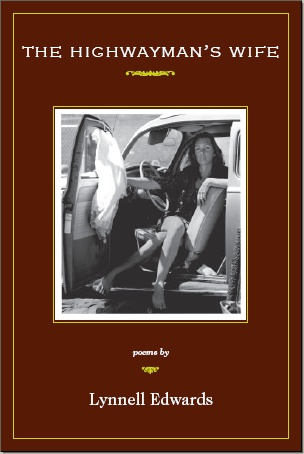Katerina Stoykova-Klemer’s interview with poet Lynnell Edwards

Lynnell Edwards is the author of two books of poetry: The Highwayman’s Wife (2007) and The Farmer’s Daughter (2003), both from Red Hen Press. Her work has appeared on Verse Daily and in the anthologies Poets Against the War; Raising Our Voices: Oregon Poets Against the War; What Comes Down to Us: 25 Contemporary Kentucky Poets and Letters to the World: Poems from the Wom-Po listserve, as well as literary journals including: Poems & Plays, Smartish Pace, Southern Poetry Review, Poetry East, and Dos Passos Review. Her poetry has been twice-nominated for a Pushcart Prize and she is a regular reviewer for The Georgia Review, Pleiades, and Rain Taxi.
She lives in Louisville, Kentucky where she teaches at the University of Louisville and is associate director for the InKY reading series and board president for InKY, Inc. She received her doctorate in English at the University of Louisville and her undergraduate degree at Centre College in Kentucky. She is the recipient of a 2007 Al Smith Fellowship from the Kentucky Arts Council.
Lynnell, let’s start with your latest book of poetry, “The Highwayman’s Wife,” published in 2007 by Red Hen press. What is “The Highwayman’s Wife” about?
The title poem is a sonnet that is one of twelve in a sequence that forms the center section of the book and which is, broadly, about the trials and travails of an eighteenth century (or so I imagined) highwayman in Scotland. In that sequence, I think, are some of the themes that govern the rest of the book – the tensions between a pull toward domesticity and, hmm, whatever the opposite of domesticity is – rootlessness? (and accompanying that, wife and mistress); also the urban and the rural as emotional and literal landscapes. Some critics really focused on the way I had used mythology in the book, which sort of surprised me, since I think the only and primary source for that is a sequence of five persona poems in the voices of some of the wives from Greek mythology, such as Hera, Penelope and others.
Your first book was “The Farmer’s Daughter,” also published by Red Hen Press in 2003. How are the two books different or similar?
I think that I explored some of those same themes mentioned above in The Farmer’s Daughter, but the treatment was less sustained, less complex in some ways. As I look back at FD, I see a lot of really lovely work that I’m very proud of; the center section of that book, which is thematically of a piece and from which the title poem comes, might be the strongest section. But I think the second book has a greater scope and stamina in its explorations and ambitions.
How did the publishing of your first book change your life?
This may sound a little crass, and maybe a little irrelevant if you believe – which most of us do to some degree or another – that producing art for art’s sake is satisfying – but having a book out is a real validation and affirmation of your identity as a working poet. And for me, with that affirmation, I felt both responsible and empowered to go out there and be a “literary citizen” in the world. This is a broad term and refers, certainly, to a variety of activities including, teaching, giving readings, mentoring, writing book reviews and other service scholarship, and publishing. I’m not saying that I couldn’t – or that I didn’t – do that kind of work before I had a book, but it certainly opened doors for me that allowed me to make the kinds of contributions I wanted to make to the literary landscape, nationally and locally.
For me, too, (and maybe I’m somebody that needs a lot of affirmation) the confidence that having a book out gave me sustained me in the sometimes lonely and rejection-filled process of writing more poetry. This sounds obvious, but if there hadn’t been a first book, there wouldn’t have been a second book. I think, too, learning to think in terms of a book – instead of just random poems – helped me grow as a poet.
You are also a writer of fiction. Have you written fiction for as long as you have been writing poetry?
I actually first wrote fiction as an undergraduate and a graduate student and had some pretty good success with it as a student – won some prizes for my work. But I didn’t come back to the form seriously until about three years ago. I wrote one story and it went so well that I set a task for myself of writing a story each month to see what would happen. If I could stick to that goal, I knew that I’d at least have a book-length manuscript – no guarantees on how good it would be, though.
I found it most rewarding to explore two similar casts of characters and settings. And so one of the sets of linked stories in the collection is about a group of people – they don’t all know each other but they have some kind of tangential relationship – who are spending the fourth of July weekend on a lake in Alabama. The second set of stories is about the parents and the boys who play on a youth club soccer team.

And what are your current creative projects that are in progress now?
I have a third manuscript of poetry titled Covet that I have sent to several contests (fingers crossed!) and that I believe is ready for publication. I have also completed a manuscript of short fiction that consists of two sets of linked short stories. Several of them have been published individually already; the piece from which I read on Accents was published in the Connecticut Review this fall. I am very much seeking a publisher for this manuscript and would look forward to working with an editor on strengthening the manuscript through the connections in the stories. I am also working on an introductory poetry writing textbook for Red Hen Press that includes an anthology of poems from Red Hen authors. This has been a really fun, though very different, project and I feel very positively about the way it has developed.
You are someone who is very involved in building of literary communities. In fact, you are the associate director for the InKY reading series and board president for InKY, Inc. Please tell the readers of Public Republic about this organization.
InKY, inc (http://www.inkyreadingseries.com) is the literary arts organization in Louisville, Kentucky that sponsors the now six-year old InKY reading series. We are a non-profit organization and are planning, in the coming year, to review our mission with the intent of expanding our outreach and our programming in Kentucky. We hope to begin providing other kinds of services for writers, like master classes with visiting authors, and building partnerships with other arts and advocacy groups in Louisville. There is a lot of great literary activity in the Louisville area and we think there will be a lot of support for building something like a literary center that can bring some of these things together.
You are also well-known as a book reviewer. Do you think that reviewing books is an art?
Absolutely; it’s rewarding, creative work that I recommend for any writer in any genre as a way to improve her facility and skill in her art (and reviewing across genres is an excellent workout as well!) I also think reviewers provide a valuable service for the literary community through accessible, smart interpretations and recommendations about new literature which I think serves to build audiences for literature as well. We have plenty of academic criticism that does the general reader no good and we have too many off-the-cuff and reductive opinions floating around in the blogosphere. Smart criticism is the missing link.
You’re Kentucky educated. You got a degree from Centre College and a doctorate in English from the University of Louisville. Is it helpful for a writer to have a PhD in English?
Increasingly, it seems almost required for a writer to have a PhD if she’s going to be competitive in the academic job market. The emergence of more and more PhD programs in creative writing suggests that, among other things, an MFA no longer provides competitive credentials if you want a faculty job in a four-year college. That said, can you be a great writer without a PhD? Obviously and absolutely.
That doesn’t mean that somewhere along the way, though, you don’t need to do the hard work of learning and practicing your craft – and when possible with the mentorship of someone more skilled than you and whose work you admire – in other words, someone who can teach you something you don’t know. For me, doing the work of a PhD provided exactly that. I learned the discipline it took to persist in the lonely work of reading and writing; I was deliberately and intentionally exposed to the necessary reading, and it helped me understand what it took to improve as a writer and scholar.
What do you wish for the readers of Public Republic?
One thing that my introduction to you and your work – including your own writing, and the Accents broadcast, publishing house and Public Republic – has shown me is the ways in which participation in the global literary community is not only possible but necessary. And so I would say I’m really impressed by this joint, global publishing project and I think we need more like it!











No comments so far ↓
Nobody has commented yet. Be the first!
Comment